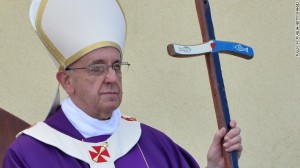 Theodore Dalrymple is too kind in his assessment of the previous pope, a clever man, certainly, but one capable of thoroughly disingenuous argument, but that aside, this critique of some comments made by Francis, his successor, during the course of a visit to the Italian island of Lampedusa is a must-read.
Theodore Dalrymple is too kind in his assessment of the previous pope, a clever man, certainly, but one capable of thoroughly disingenuous argument, but that aside, this critique of some comments made by Francis, his successor, during the course of a visit to the Italian island of Lampedusa is a must-read.
An extract:
Lampedusa is an Italian island of 8 square miles with a permanent population of 6000, which so far this year has received 7800 migrants trying to reach Europe across the Mediterranean from sub-Saharan and North Africa, that is to say more than 1000 a month. When the Pope officiated at mass on the island’s sports field, there were 10,000 in the congregation, two thirds more than the permanent population, suggesting that the migrants stay a few months at least on Lampedusa….
In effect the island has been transformed into a refugee camp, not necessarily with the approval or agreement of the original inhabitants. This was a fait accompli imposed upon them by political, historical and geographical circumstances.
Estimates suggest that about 100 migrants a month for the past twenty years have drowned during their clandestine passage across the Mediterranean towards Europe. This being the case, no one could possibly say that the migrants decided on the journey in a whimsical or light-hearted fashion. The attraction of Europe or the repulsion of their homelands, or both, must be very powerful for so many people to risk so high a chance of so pathetic a death. The Pope said that all his compassion went to the immigrants who had died at sea ‘in these boats that, instead of bringing hope of a better life, brought them to death,’ and this was right and proper. Surely someone must be lacking in both imagination and feeling not to sorrow for these poor people.
Compassionate fellow-feeling, however, can soon become self-indulgent and lead to spiritual pride. It imparts an inner glow, like a shot of whiskey on a cold day, but like whiskey it can prevent the clear-headedness which we need at least as much as we need warmth of heart. Pascal said that the beginning of morality was to think well; generosity of spirit is not enough.
In his homily, the Pope decried what he called ‘the globalization of indifference’ to the suffering of which the tragedy of the drowned was a manifestation and a consequence. Our culture of comfort, he said, has made us indifferent to the sufferings of others; we have forgotten how to cry on their behalf. He made reference to the play of Lope de Vega in which a tyrant is killed by the inhabitants of a town called Fuente Ovejuna, no one owning up to the killing and everyone saying that it was Fuente Ovejuna that killed him. The West, said the Pope, was like Fuente Ovejuna, for when asked who was to blame for the deaths of these migrants, it answered, ‘Everyone and no one!’ He continued, ‘Today also this question emerges: who is responsible for the blood of these brothers and sisters? No one! We each reply: it was not I, I wasn’t here, it was someone else.’
The Pope also called for ‘those who take the socio-economic decisions in anonymity that open the way to tragedies such as these to come out of hiding.’
With all due respect, I think this is very loose thinking indeed of a kind that the last Pope would not have permitted himself. The analogy between the two situations, the murder of the tyrant in Fuente Ovejuna and the death by drowning of thousands of migrants, is weak to the point of non-existence. After all, someone in Fuente Ovejuna did kill the tyrant; no one in the west drowned the migrants. Is the Pope then saying that Europe’s refusal to allow in all who want to come is the moral equivalent of actually wielding the knife?
By elevating feeling over thought, by making compassion the measure of all things, the Pope was able to evade the complexities of the situation, in effect indulging in one of the characteristic vices of our time, moral exhibitionism, which is the espousal of generous sentiment without the pain of having to think of the costs to other people of the implied (but unstated) morally-appropriate policy…..
Quite.

Dear Pope Francis,
I wasn’t there; it was someone else.
Sincerely,
Narr